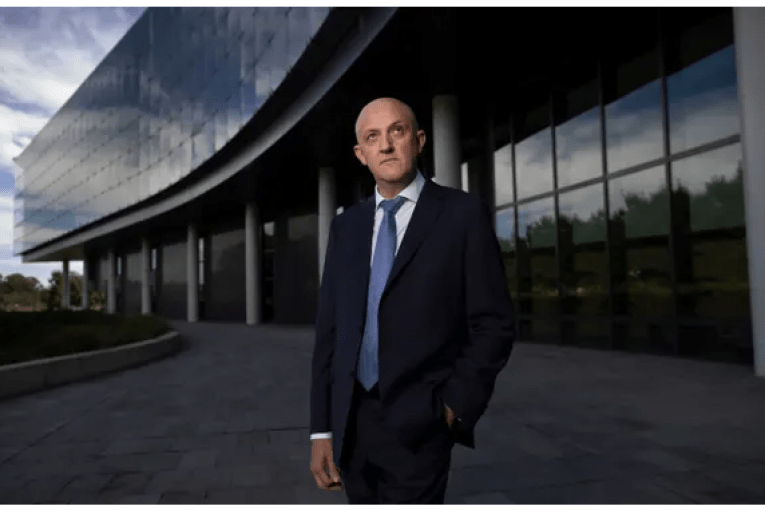Man in the middle: The art of going completely unnoticed while chaos rages all around
Few professionals could survive the pressure – and live with the the scorn – of being the man in control of a top-level rugby match. Michael Blucher takes us deep into the world of leading Australian referee Nic Berry


Nic Berry thrives in the pressure-cooker environment of Super Rugby (Pic: rugby.com.au)
Wanted: Professional with a clear understanding of approximately 3000 laws. Able to make split second decisions (without hesitation or error, fear or favour) for 80-plus minutes, all while warding off the gratuitous advice of up to 30 combative warriors.
The successful applicant should also be aware, the said decisions will be recorded and replayed (often in slow motion) along with any audible commentary, in full view/earshot of the warring parties, and to the merriment and/or disgust of up to 82,000 on-lookers, seated within the immediate confines of your “office”.
Disclaimer: observers/on-lookers are most likely to be emotionally invested, and the judgment of some at least temporarily impaired by the excessive consumption of alcohol.
Thick skin and superior fitness preferred. Apply within.
Rugby Union referee – seriously, who’d take it on? Unless you absolutely had to.
Meet Nic Berry, one successful “applicant” who’s now living the career dream, a dream that on the strength of all available evidence offers a sense of reward comparable only to that of a council parking officer, getting abused by motorists who’ve found infringement notices pinned to the windscreen of their vehicles.
Yes, it’s undeniably true – some career paths are smoother and less stressful than others.
Only ardent rugby fans would remember Nic Berry from his playing days at the Queensland Reds.
He chalked up 33 games at scrumhalf between 2004-2007 before heading to Europe, the offer of a three year contract with the prestigious Metro Racing Club in France far too enticing to decline. It was a good call – Will Genia arrived on the scene at the Reds in the same calendar year.
Deep down, Berry was stunned by the overseas interest. He saw himself as a journeyman at best, and yet here he was, riding a scooter down the Rue du Nord in Paris, to train and play with the likes of All Blacks legend Andrew Mertens, Fijian wing sensation Sireli Bobo, Springbok super boot Francois Steyn and French superstars, Sebastien Chabal and Lionel Nallet, the national captain.
Private planes, five star accommodation, six figure salaries, supplemented by win bonuses and other miscellaneous privileges – life was really bloody good.
The son of itinerant hotel managers Clyde and Barbara, who grew up in a housing commission home in Woodridge, Berry had to regularly pinch himself, just to make sure it wasn’t all a dream.
After three seasons with Metro Racing, Berry was offered a two-year deal to play for top-flight English club Wasps. He and his wife, Mel, were contemplating starting a family – it made sense to undertake that challenge in an English speaking country, even more so when it became clear Mel would be well placed to pursue her chosen career path as a lawyer. London it was.
Like he’d done at the Reds and the Racing Club in Paris, Berry worked as hard if not harder than anyone in the squad to squeeze every ounce of talent out of his ability.
He played and played well. He also embraced the ancillary offerings of English club rugby – well-heeled benefactors, for instance, who were able to provide study opportunities and paid work experience that was well in advance of his station in life. He knew at some point he’d wake up and the dream would be over.
In 2013 it was, very abruptly – a series of serious head-knocks forcing him into early retirement. With two infant children among their carry-on luggage, the Berrys flew home to Australia, in readiness for the next leg of their life journey.
In addition to a business degree, Berry was also a qualified teacher, so in 2014, at the age 30, he accepted a job at St Josephs College, Gregory Terrace, at last justifying the nine years of tertiary study he’d relentlessly pursued while playing and travelling.
Twelve months later, just when he thought teaching religion to a 15-year-old Harry Wilson was going to be his greatest career challenge post professional rugby, the head coach of Australian Rugby’s referees Andrew Cole came knocking on Berry’s door, asking him if he had any interest in “blowing a whistle”.
Cole and the head of rugby match officials, Scott Young, were privately conceding the existing referees’ pathways system wasn’t producing what they were after. They’d decided to reverse-engineer the program – find the right bloke with the right personality, and turn him into a ref.
Hence the approach to Berry.
As a player, the strongly built No 9 was regarded as a fierce but fair competitor, personable and polite, respected by teammates and opposition alike. Additionally as a scrumhalf, he was constantly required to make split-second decisions, most of them close to the epicentre of the on-field action.
Berry saw what went on in all aspects of the game and was accustomed to directing traffic in peak hour. Yep – he was just what they were looking for.
“I’d clearly had enough serious head knocks to say yes,” Berry laughed, reflecting on his slow burn decision to accept the SOS call. “But I never thought about refereeing as a career. I was more interested in the challenge of doing something difficult. After retiring from playing, I missed the adrenalin rush that came from performing under pressure.”
In just his second season of refereeing, Berry was officiating Super Rugby matches, the judgment of Andrew Cole and Scott Young proving deadly accurate.
With his game awareness, his calm, considered manner, and genuine insight into the mindset of professional players, the globetrotting scrumhalf rose rapidly through the refereeing ranks.
To fast-track his understanding of scrums and lineouts, he enlisted the assistance of his former Reds teammate, flanker Mitch Chapman, a set piece savant. Chapman was so insightful, Rugby Australia soon after offered him a full time job, employment which continues today.
It wasn’t long before Super Rugby coaches on both sides of the Tasman were requesting Berry officiate their matches. In 2018, he flew to Scotland to referee his first Test match in front of a capacity crowd of 70,000 at Murrayfield, his nerves only settled by a none-too-subtle reminder from his best mate, “Zoc” – “Relax Bez – none of those people are there to watch you. Just do your job and keep ‘em honest. If you focus on that, no one will even notice you’re there”.
That’s something Berry has tried desperately to do, every time he “mikes’ up” and runs on. He understands better than most that rugby is a “players game”. But even with the best of intentions, staying out of the way is not always easy – not with “a job” to do.
Rugby is a complex game, riddled with technical nuance and subjective interpretation.
Last week’s thrilling Super Rugby final at Suncorp highlighted just how easy it is for the referee to become the focal point, even when he’s trying like hell not to be.
Berry sent two Brumbies players to the bin in the dying moments – referee officials critiquing his performance suggested he could have marched more – and awarded a penalty try – even if it meant ruining the contest.
Rightly or wrongly, afterwards Berry was remorseful that he’d had such a profound impact on the game, the consoling words of a senior Brumbies player in the sheds little consolation. “Mate, that loss stings like hell at the moment, but seriously, how good for Australian rugby,” the player said.
One of Berry’s strengths as a referee is his preparedness to “own up when he stuffs up”. You’ll occasionally hear his voice in the television coverage – “Sorry boys – I missed that one. My bad….”
He’s a rarity in that he will often call a team coach during the weekly review process and admit his mistakes. Belated access to all the different camera angles, and the luxury of slow motion replays, makes it impossible to hide. Why bother trying? Sorry coach, I got that wrong.
“Referees are human,” Berry says. “Just like the players, we’re going to make mistakes. The difference is the players have teammates to pick up the ball they’ve dropped, or make the covering tackle they’ve missed. We’re on our own out there.”
Rugby fans would be astonished if they knew the depth and breadth of a referee’s match preparation – the endless hours of analysis, drilling down into expected patterns of play, critical one-on-one contests, and of course, deliberate endeavour to bend the rules, without breaking them. Let’s call it honest cheating.
Every match performance is assessed to within an inch of its life – the referees’ are marked on all aspects of their game – the policing of off side, scrums and lineouts, rucks and mauls, and increasingly, foul play.
There’s not just correct decisions – there’s “high impact decisions” and “non-decisions” – no wriggle room for too many of those, or you’ll find yourself refereeing rugby matches in Siberia.
Yes, it’s a tricky business.
Berry is smart enough to stay well away from social media. In the interest of his mental health, he concedes he’s better off not knowing what’s being said and written. He offers the same advice to his children – “don’t let other people steal your energy”.
He loves his weekends at home, standing silently on the sideline, watching junior sport – Will’s under 10 rugby matches and Mila’s under 8 netball games.
Berry regularly listens to parents barking abuse at the officials, commonly 12 or 13 year old-kids, getting paid $15 for their trouble. He’s full of admiration, yet the darker side of him wonders how long they will last with a whistle in hand.
In a similar sense Berry doesn’t know how long he’ll continue to referee professionally. There’s no end goal of officiating in a Rugby World Cup final – he’s content, as long as he’s learning and growing, become a better referee, a better husband, a better father.
In terms of advice for aspiring young refs, the 37 year-old is crystal clear – “prepare to the best of your ability, embrace the challenges that the role presents and understand that you’re going to make mistakes”.
As for dealing with difficult players, Berry remembers early in his career being afforded some very sound advice – “Don’t get dragged into an argument with the village idiot, because anybody walking by, won’t know who’s who”.












